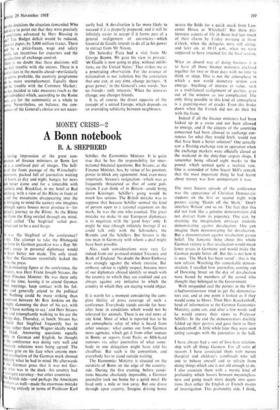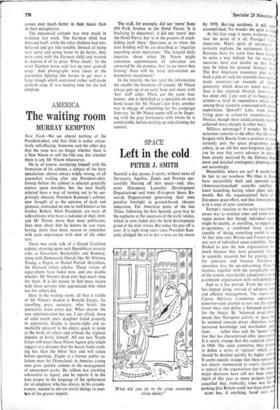A Bonn notebook
MONEY CRISIS-2 B. A. SHEPHERD
lasting impression of the great con- anon of finance ministers in Bonn last k is a confused pair of images. The hell- of the front passage of the Wirtschafts- ieriiiin, packed full of journalists waiting all hours at day and night, hungry for news h never came and for a timetable with definite end. Breakfast, in my hotel' at Bad ,berg, with a view of the Rhine in front of and the mountains disappearing into the bringing to mind the scenery one imagines though opera houses never produce it—for fried's journey to the Rhine. As the Rhine is from the Ring swirled through my mind, vessel called 'The Siegfried' sailed past. ned out to be a coal barge.
o was the Siegfried of the conference? one. The attempt to take the Rhinegold y from its German guardian was a flop. Mr on's essay in personal diplomacy would been better not made. The only result that the Germans resentfully leaked the
s to the press.
e dominating figure at the conference, the victor, was Herr Franz Joseph Strauss, the rrnan Finance Minister. He was there only of the time, leaving it to attend German net meetings, keep contact with his fol- ers and generally attend to the political e. Nothing could be more striking than contrast between Mr Roy Jenkins on the night slamming the door of his car, with of '1 have nothing to say.' and Herr Strauss y and triumphantly walking to his car the owing day, Thursday, at lunch. Strauss has build that Siegfried frequently has in ice. rather than what Wagner ideally would 'e liked. Answering questions equally ntly in German and English, he thought t the conference was doing very well and factory solutions were being agreed. The rmous grin on his face when anyone men- ed revaluation of the German mark showed pletely what he had in mind. He afterwards the German press that it was not Ger- Y %sho was in the dock—his country had strongest currency—but other countries. e British side—and perhaps the Americans others as well—made the enormous mistake thinking entirely in terms of Professor Karl
Schiller, the Economics Minister. It is quite true that he has the responsibility for inter- national financial questions. But Strauss, as the Finance Minister, has, by virtue of his position, power to block any agreement. And, even more important. Strauss's resignation—which was as frequently threatened as that of some poli- ticians I can think of in Britain—could bring down Kiesinger. Schiller's going would be much less serious. The British mistake was to suppose that because Schiller seemed the kind of person open to a rational argument on the mark, he was the one who counted. The great mistake we make in our European diplomacy is to negotiate with the 'good boys' only. It might be nice (though infinitely boring) if we could talk only with the Schroeders. the Brandts and the Schillers. But Strauss is the one man in Germany with whom a deal might have been possible.
Alas, such considerations were very far indeed from our protocol-minded Treasury and Bank of England. No doubt the Bonn Embassy was strongly against the whole exercise. But embassy advice is rightly suspect, because most of our diplomats abroad identify so much with the country to which they are credited and are always against any initiative to which the country in which they are staying would object.
It is worth for a moment considering the com- plete futility of press coverage of such a conference. Everybody stands outside for hour after hour in conditions which would not be tolerated for animals. There is no real news of any kind. Most of what is reported has to be an atmospheric relay of. what is heard from other sources: what comes out from German news agencies, which get it from other sources in Bonn: or reports from Paris; or fifth-hand rumours via other journalists of what some- body in one delegation might have told his chauffeur. But such is the convention, and everybody has to stand outside waiting.
The Economics Ministry is situated on the outskirts of Bonn on the edge of the country- side. During the first evening, before condi- tions became absolutely impossible, a German journalist took me home for a quick meal. He lived only a mile or two away. But one drose through open country. Imagine driving home across the fields for a quick snack from Lan- caster House or Whitehall! But these pic- turesque aspects of life in Bonn had lost much of their charm by Friday morning at three o'clock, when the delegates were still sitting, and later on, at 10-11 a.m., when we were supposed to have returned for the final session.
What an absurd way of doing business it is to have all those finance ministers enclosed together for two or three days with no time to think or sleep. This is not the atmosphere in which a new world monetary system can emerge. Anything of interest or value, such as a multilateral realignment of parities, goes out of the window as too complicated. The only thing possible in this kind of atmosphere is a papering-over of cracks. Even this broke down when the French did not do their bit with the franc.
Indeed if all the finance ministers had been locked up in a room and not been allowed to emerge, and if the citizens of the countries concerned had been allowed to exchange cur- rencies for what they would fetch, would not that have been a better solution? One actually saw a floating exchange rate in operation when the exchange markets were officially closed at the weekend in the duty-free airport shops. I remember being offered eight marks to the pound, which seemed quite a realistic rate. One is reminded of John Stuart Mill's remark that the most important • thing he had learnt about money was how unimportant it was.
The most bizarre episode of the conference was the appearance of Christian Democratic students on the first or second night with posters shying 'Hands off the Mark.' Don't interfere Wilson' and so on. The fact that this did not look like a genuine demonstration did not distract from its piquancy. One can, by straining the imagination, envisage students demonstrating against devaluation. One can imagine them demonstrating for devaluation. But a demonstration against revaluation passes belief. The fantastic thing about this whole German victory is that revaluation would mean lower prices in Germany and would make the German people better off. But this is not how it is seen. 'The Mark has been saved': that is the new refrain. Watching this remarkable demon- stration, I recalled how journalists coming out of Downing Street on the day of devaluation were booed by members of the crowd who thought they belonged to the Government.
With misguided zeal the porters in the Wirt- schaftsministerium tried to get the demonstra- tors out, and at one point it looked as if they would come to blows. Then Herr Kaeckenhoff, head of information at the German Economics Ministry, came out, and after a few words said he would convey their views to Professor Schiller. In the end the demonstrators docilely folded up their posters and gave them to Herr Kaeckenhoff. A little while later they were seen eating sausages with the journalists in the hall.
I have always had a sort of love-hate relation- ship with all things German. For all sorts of reasons I have associated them with nurses (hospital and children's combined) who tell one to behave oneself and to refrain from doing things which one is not old enough to do. I also associate them with a mystic kind of profundity which hovers between meaningless- ness and going much more deeply into ques- tions than either the English or French modes of investigation. This profundity side, I think, comes over much' better in their music than in their metaphysics.
The nursemaid attitude was very much in evidence last week. The German child had behaved itself, while the other children had mis- behaved and got into trouble. Instead of being very sorry and going home to do better, they were cross with the German child and wanted to deprive it of its prize. What cheek! So the strict German nurse said 'eat up your goulash soup.' And photographs were taken of the journalists fighting like horses to get near a large trough which contained rather well-made goulash soup. It was feeding time for the bad children.







































 Previous page
Previous page